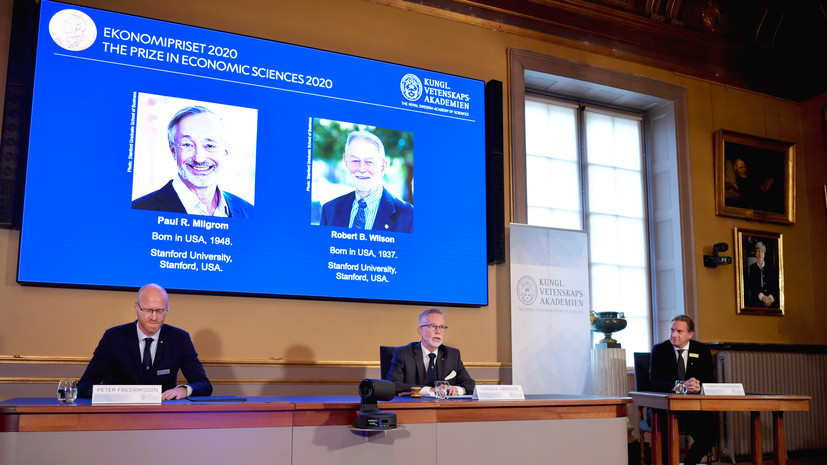This year the Nobel Prize in Economics was awarded to Paul Milgrom and Robert Wilson for improving auction theory.
American professor at Stanford University Paul Milgrom is 72 years old.
He is an expert in game theory, industry market economics, economic history, and auction theory.
The scientist is widely known for his books "Economics, Organization and Management", as well as "How to make auction theory work."
Economist Robert Wilson, 83, is also a Stanford University researcher in market modeling, pricing, and game theory.
One of his main scientific works is the book "Nonlinear Pricing".
“This year's laureates Paul Milgrom and Robert Wilson have studied how auctions work.
They also used their ideas to develop new auction formats for goods and services that are difficult to sell in the traditional way, such as radio frequencies.
Their discoveries have benefited sellers, buyers and taxpayers around the world, ”says a press release from the Nobel Committee of the Royal Swedish Academy of Sciences.
As the head of the laboratory of the Institute of Applied Economic Research of the RANEPA, Alexander Abramov, said in an interview with RT, for the second year in a row the award is aimed at encouraging the experimental activities of scientists.
“In essence, the work of Milgrom and Wilson is not associated with any global discovery, but at the same time they promote new theories and approaches for the development of a market model in the global economy.
In a broad sense, this study assumes the choice of optimal solutions when conducting various types of auctions.
That is, economists told how bidders behave, and also found new formats for selling goods and services through auctions, ”Abramov explained.
As noted in the Nobel Committee, Wilson refined the theory of auctions for objects with a common value - not predetermined, but the same for everyone.
The scientist explained why rational bidders tend to bid below what they think is the best: they are afraid of falling under the so-called "curse of the winner" - a situation in which the bidder overpays and remains a loser.
Paul Milgrom, in turn, analyzed bidding strategies in a number of well-known auction formats and showed that the auction would bring the seller a higher expected return if its participants learn more about the estimated value of the auction items to other participants.
“This is very important for the global economy.
The basic idea is that it is easier to sell individual items than a set of items whose value depends on their combination.
Therefore, new auction mechanisms are needed to sell such complex objects.
This research has specific applications and improves life, ”said Ruben Enikolopov, rector of the Russian School of Economics, in an interview with RT.
According to Alexander Abramov, the professors were awarded the prize largely in order to popularize a specific area of economic knowledge among a wide range of scientists.
“Now the world economic school is actively looking for alternative ways to develop and quickly restore global financial and economic stability.
New approaches can become one of such tools, ”Abramov added.
Our among the best
It is curious that in the entire history of the Nobel Prize in Economics, only one Russian scientist received it.
In 1975, the Soviet mathematician and economist Leonid Kantorovich was awarded "for his contribution to the theory of optimal resource allocation."
Earlier, in 1973, Vasily Leontiev received the prize "for the development of the input-output method and for its application to important economic problems."
However, an economist who grew up in the USSR was already working in the United States at that time and acted as a representative of the American school.
Prior to that, in 1971, the award was given to the American economist Simon Kuznets, who was born in Pinsk.
The prize was awarded “for an empirically informed interpretation of economic growth that has led to a new and deeper understanding of the economic and social structure and development process in general”.
Experts explain the presence of only one representative of Russia among the Nobel Prize laureates in economics by the weakness of national economic science during the Soviet era.
This is largely due to the fact that in Soviet times, domestic economic science was outside the world community.
At the same time, the award is mainly aimed at representatives of the market economy, says Georgy Ostapkovich, director of the Center for Business Studies at the Institute for Statistical Studies and Economics of Knowledge, NRU HSE.
“Unfortunately, economics was not one of our scientific priorities.
The same Kantorovich was not an economist, but a mathematician.
He invented a mathematical model for combining a planned economy and a market economy.
In addition, the prize is still designed for the capitalist, market model of the economy.
And in our country the socialist view prevailed.
Therefore, many works of Soviet economists simply did not pass the selection, the commission did not even consider them, "Ostapkovich said.

